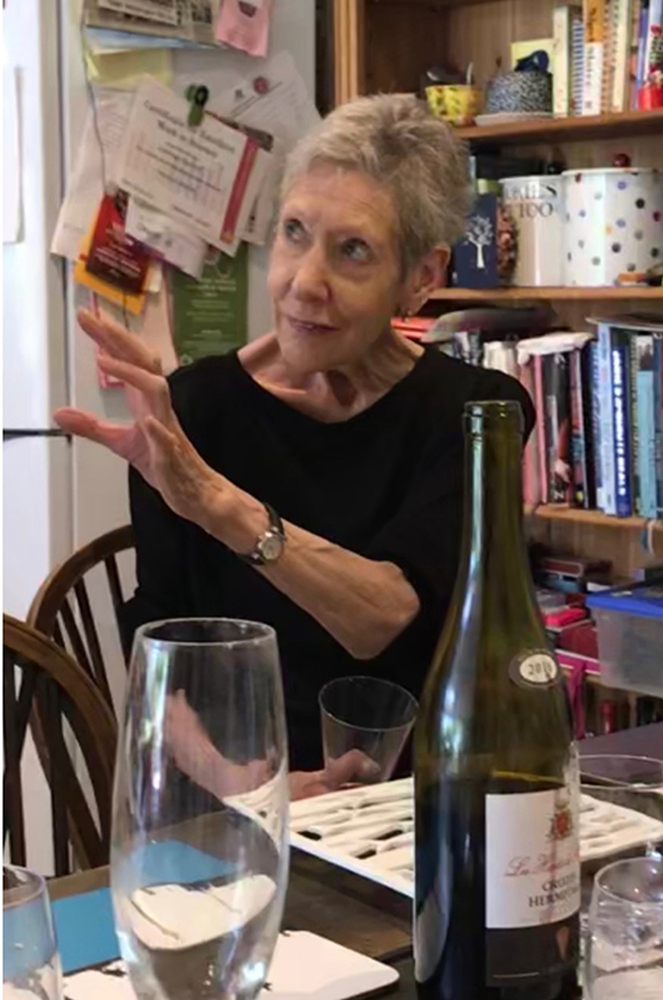

Friends, colleagues and former students all over the world were greatly saddened to learn of the death of Professor Amélie Kuhrt in January 2023, after a short illness. A paradigm-breaking historian of the Achaemenid empire, she was as irreverent, kind and funny as she was intellectually exacting and original.
Amélie was born and grew up in post-war Germany, largely brought up by her grandmother, as her single mother was the main breadwinner. At the age of 10 she had to leave Germany and her beloved half-brother Martin (who also became an eminent historian) and grandmother, when her mother married a member of the British occupying forces. As her stepfather was in the RAF, they moved a number of times, so she attended schools in Bath, Leamington Spa and Norwich. Her mother and stepfather scrimped and saved to send her to a sixth form college where she might follow her passion for the Classics and study ancient Greek and Latin at A and S levels.
She began a degree in Classics at Kings College London in the mid-1960s, but after one term switched to Ancient Near Eastern History at UCL. Despite giving birth to her first child, Natasha, in 1966 when she was about to sit her finals, she still came out with a 2:1. Amelie started a PhD and conducted extensive fieldwork in Iraq and Egypt, but she had to abandon it, discouraged by very unsupportive graduate supervision. With the birth of Tanya in 1968, she was now bringing up two children and juggling part-time work, including a job at Chatham House and gallery talks for the British Museum, as well as part-time tutoring at UCL. She was brought into academia full-time by Roman historian Fergus Millar, who had long recognized her talent and originality. Fittingly, Amélie was soon appointed as successor to Margaret ‘Peggy’ Drower, whose lecturing had so inspired her as an undergraduate.
In her forty-year career at University College London (1979–2009), as Lecturer, Reader, and, from 1997, Professor of Ancient Near Eastern History, Amélie fostered an inclusive, collaborative, interdisciplinary research culture that transformed the study of ancient imperialism. In 1983 she became co-convenor of the Achaemenid History Workshop, founded by Heleen Sancisi-Weerdenburg in 1980, and together they led a veritable historiographical revolution. Collectively, the Workshop demonstrated the value of studying the Persian empire from within and below, and the interpretative limitations of relying solely on peripheral Classical sources (Kuhrt et al., eds., Studies in Achaemenid History, 10 vols, Netherlands Institute for Near Eastern Studies, 1987–1996). Her invaluable collection, The Persian Empire: A Corpus of Sources from the Achaemenid Period (Routledge, 2007) is at once a magisterial demonstration of her encyclopaedic grasp of the evidence, operating principles and open questions in her specialism, and a generous opening up of the field to others. Not only was her sourcebook translated into Farsi but it won Iran's World Prize Book of the Year in 2010. She flew to Teheran to receive the prize from President Ahmadinajad.
Amélie's spirit of collaborative interrogation of overlooked sources, and a playful challenging of old orthodoxies, also drove her other major projects. Together with Susan Sherwin-White, Amélie shook up the study of the Seleucid empire by pointing out its essential Middle Eastern-ness. Their two co-edited volumes, Hellenism in the East: the interaction of Greek and non-Greek civilizations from Syria to Central Asia after Alexander (Duckworth, 1987), and From Samarkhand to Sardis: a new approach to the Seleucid Empire (Duckworth, 1993) provoked heated debate. As well as attracting widespread positive reviews, Samarkhand became the subject of an international conference, the very same year it came out, the proceedings of which were published in Topoi 4/2 (1994).
Likewise, Amélie's edited conference volume with Averil Cameron, Images of Women in Antiquity (Routledge 1983, 2nd ed. 1993), was typically capacious in its chronological, geographical, thematic and methodological range, and its focus on the hitherto neglected. Its longevity and reach are reflected in the fact that it was translated into Arabic as recently as 2016 (Ṣūrat al-marʾah fī al-‘Uṣūr al-qadīmah, Cairo: Al-Markaz al-Qawmī lil-Tarjamah).
Amélie's inclusivity extended to her teaching and mentoring of students and colleagues, many of whom became life-long friends. Her two-volume History of the Ancient Near East, 3000–300 BC (1995), based on her much-loved lectures for the BA in Ancient Near Eastern History and Egyptology at UCL, immediately became an essential university textbook across the globe, never surpassed in its range of subject matter and depth of detail. In 1997 it was awarded the American History Association's James Henry Breasted Prize for the best book in English on any field of history before 1000 AD. Professor Eva von Dassow of the University of Minnesota is currently undertaking the daunting task of updating it for a new generation of students.
In recognition of her profound influence on ancient history, Amélie was elected as a Fellow of the British Academy in 2001, though she was never one to enforce academic hierarchies. A leading light of both the Institute of Classical Studies’ Ancient History Seminar and the London Centre for the Ancient Near East, she remained intellectually active and academically productive long after retirement. Her works have been translated into Arabic, Farsi, French, German, Hungarian, Italian, Polish, Spanish, and Turkish. Her legacy lives on not only in her written words — which resound with the sound of her distinctive voice, for those who had the privilege to know her — but through the example she set throughout her career of hospitality, humour and intellectual acumen.
Amélie is survived by her daughters Natasha and Tanya, her partner Patrick Chorley, and grandchildren Hector, Kitty and Lydia.


